Pro-government accounts use old images to depict Ugandan protesters as hooligans
Twitter campaign ensured anti-protester hashtag trended in Uganda after protests broke out following arrest of a presidential candidate
Pro-government accounts use old images to depict Ugandan protesters as hooligans
Share this story
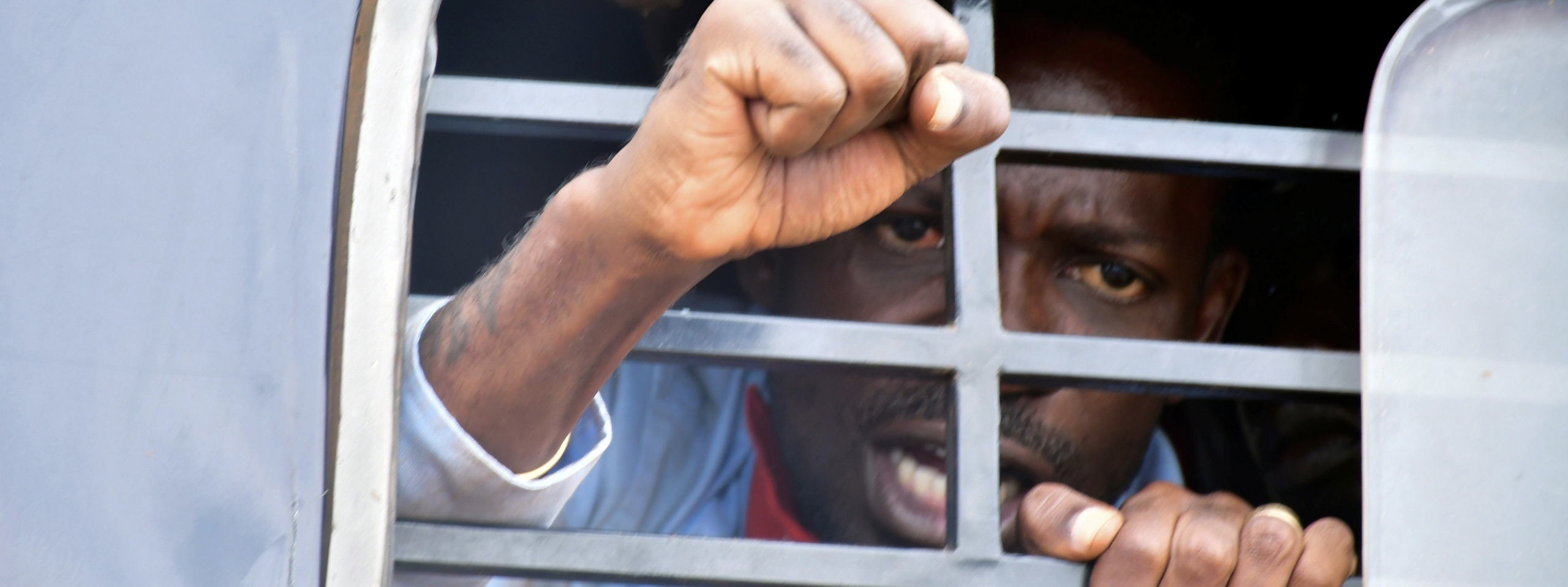
BANNER: Ugandan presidential candidate Robert Kyagulanyi, also known as Bobi Wine, reacts from inside a police van, in Luuka district, Uganda, November 18, 2020. (Source: REUTERS/Abubaker Lubowa)
In early November 2020, pro-government accounts in Uganda started tweeting #StopHooliganism in an attempt to paint anti-government protesters as violent thugs. Protests broke out in the country after famous singer and politician Robert Kyagulanyi Ssentamu, known by his stage name Bobi Wine, was arrested on November 3, just minutes after being certified as a presidential candidate in next year’s election.
Wine, who is part of an advocacy group seeking to remove President Yoweri Museveni from power, was arrested again on November 18 for allegedly flouting coronavirus prevention regulations. His arrest sparked violent protests and unrest in multiple cities across the country, with 54 people killed by police and security agencies, according to police spokesperson Fred Enanga.
The group of Twitter accounts worked to present Wine and his supporters as destructive hooligans. However, many of the images used as evidence of violence allegedly committed by protesters were lifted from old news articles about protests and riots in the country, some dating back to 2011.
#StopHooliganism
The #StopHooliganism hashtag trended after media reported Wine was arrested on the two dates in question, as pro-Museveni accounts attempted to paint protesters as violent thugs and hooligans.

The hashtag had been used previously by a handful of accounts located in India. On November 3, however, a user named @k_siima promoted the hashtag in relation to the Ugandan protests. The account, created in April 2020, had a similar username to Siima K K Sabiti, a verified radio presenter and voiceover artist from Uganda. According to Twitter monitoring tool Twitonomy, @k_siima tweeted a handful of times in April when the account was created, primarily in support of the Ugandan police, then was dormant until the Bobi Wine-related protests broke out.
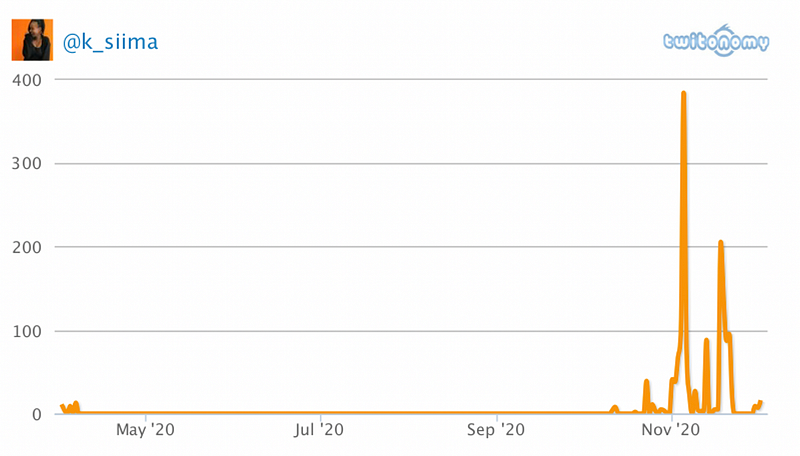
At 01:25 East African Time on November 4, @k_siima posted two tweets with the hashtag #StopHooliganism.
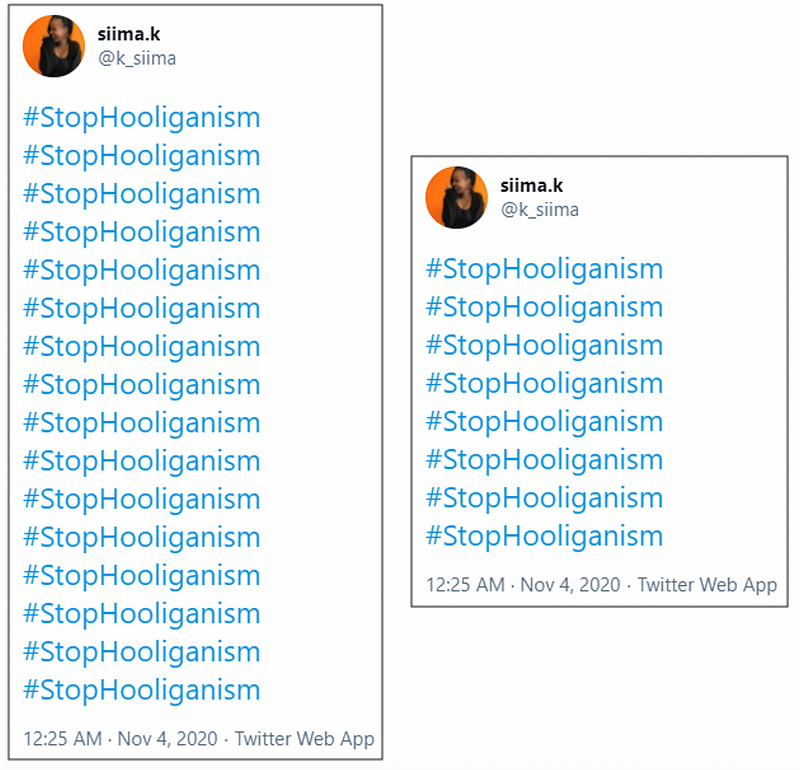
Less than an hour later, the account posted an image of an armed soldier walking down a burning road, claiming it was evidence of “hooligans” destroying public roads. However, the image was actually taken during unrelated killings that took place at protests in Uganda in 2011, not during the November 2020 protests, according to a fact-check by PesaCheck.
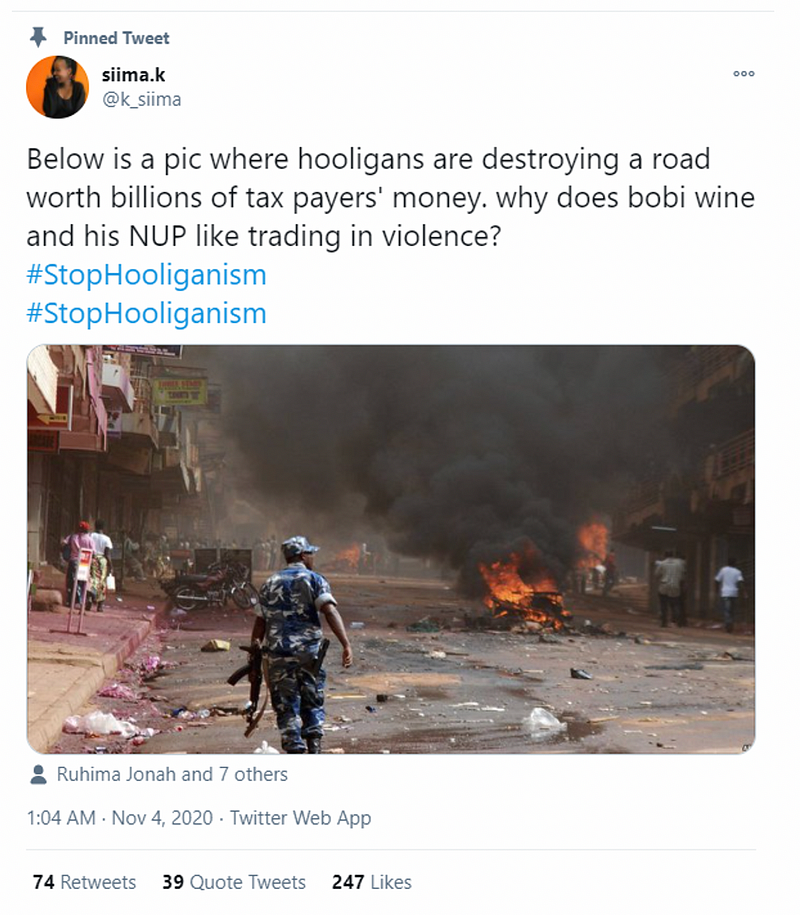
The 2011 image posted by @k_siima was shared by other prominent accounts in the pro-Museveni network to amplify the #StopHooliganism hashtag. One user, @AsantejnrRuhima, who was tagged in @k_siima’s image, posted the photograph 11 times.
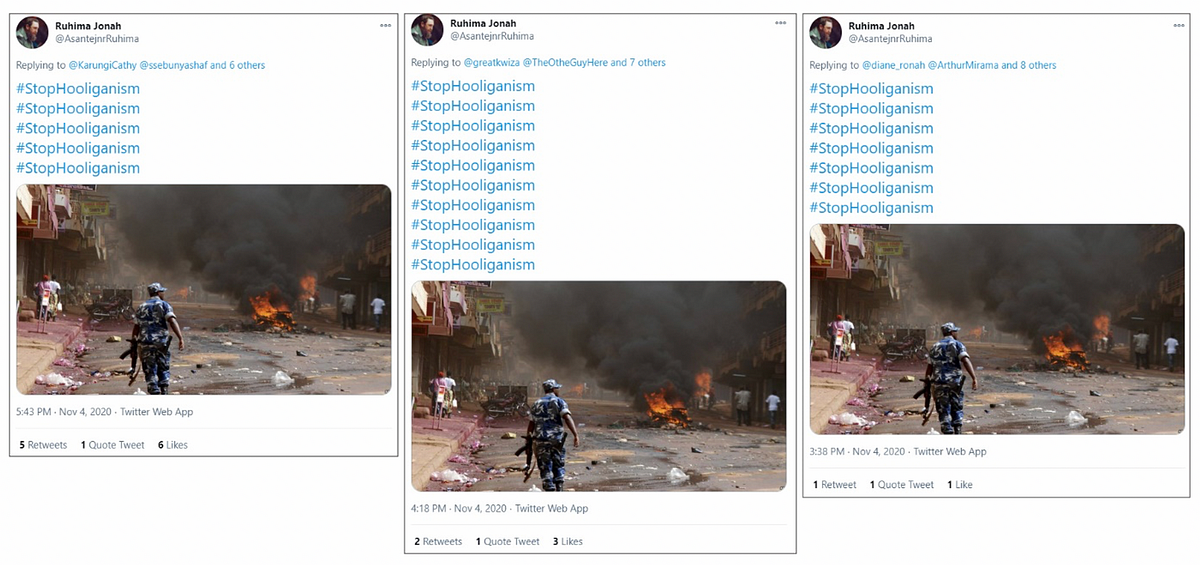
Many of the accounts actively promoting the #StopHooliganism hashtag did not post any images actually taken during the protests following Wine’s November 3 arrest. Although the images appeared to be primarily lifted from news stories about protests and riots in Uganda, very few, if any, were images of the situation in the country on November 3 and 4.
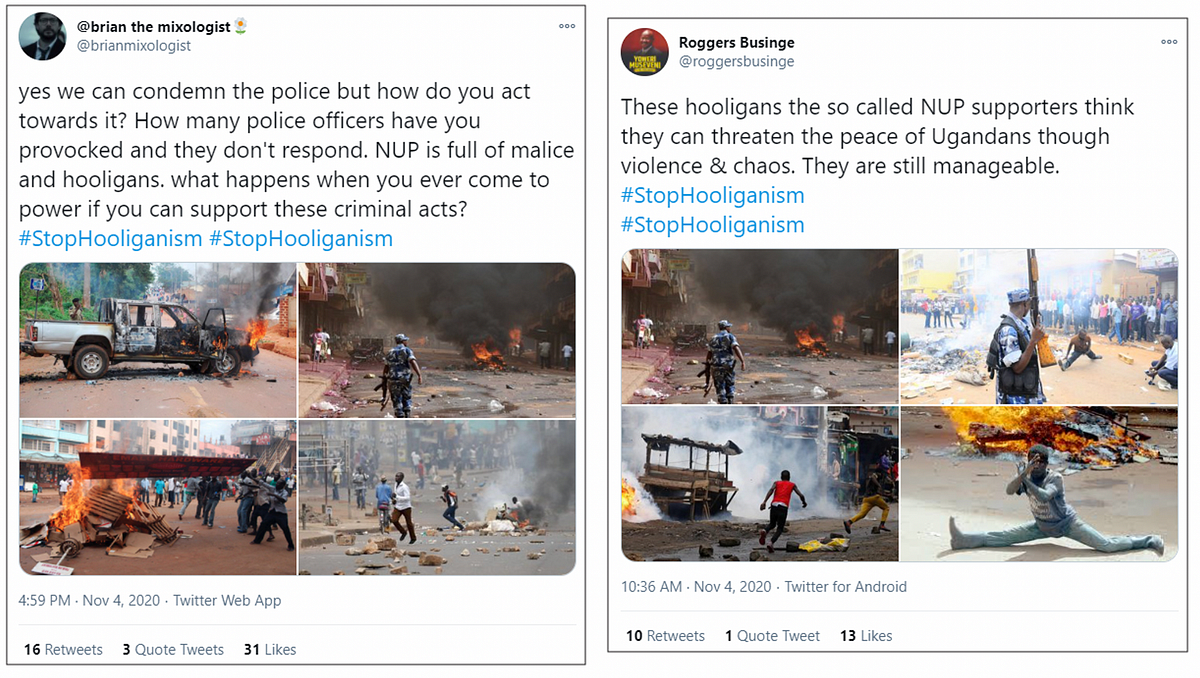
Following Wine’s second arrest on November 18, the accounts took to posting legitimate images of the protests that had turned violent, interspersed with older imagery. On December 2, Ugandan police clashed with Bobi Wine supporters again as security forces shot at the presidential candidate’s vehicle. Bloody imagery of Wine’s injured team members spread online, and Wine subsequently suspended his political campaign, claiming it was being affected by police brutality.
Although the #StopHooliganism hashtag was amplified by the pro-Museveni accounts, it did not gain as much traction as it had the two previous times. From December 1–4, the hashtag was only mentioned 1,550 times. Most of the content mentioning #StopHooliganism consisted of retweets and quote tweets, with only 103 original tweets making up the total posts using the hashtag during that time frame.
Images from old protests and riots in Uganda, which were previously spread at the start of November, were again used during this time period to paint Wine’s supporters as hooligans. The account @k_siima posted four images allegedly of protest hooliganism early in the morning of December 2. The first image is an Alamy stock photograph with watermarks included of weapons confiscated from the royal guard of a Ugandan king charged with murder in 2016. The second and third images are from the 2011 riots in Uganda, and the fourth is an image of a Ugandan comedian who was arrested in 2018 for beating up a traffic officer.
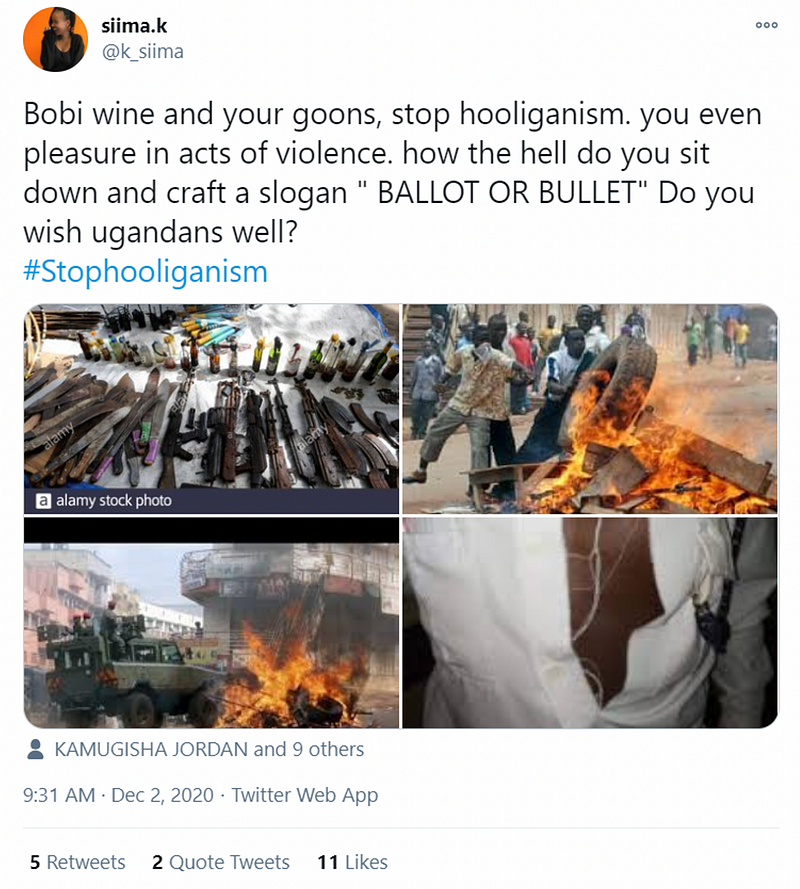
Some of the accounts that had been active in promoting the #StopHooliganism hashtag throughout November also posted fake claims that the United Nations office in Uganda would close their offices the following day.
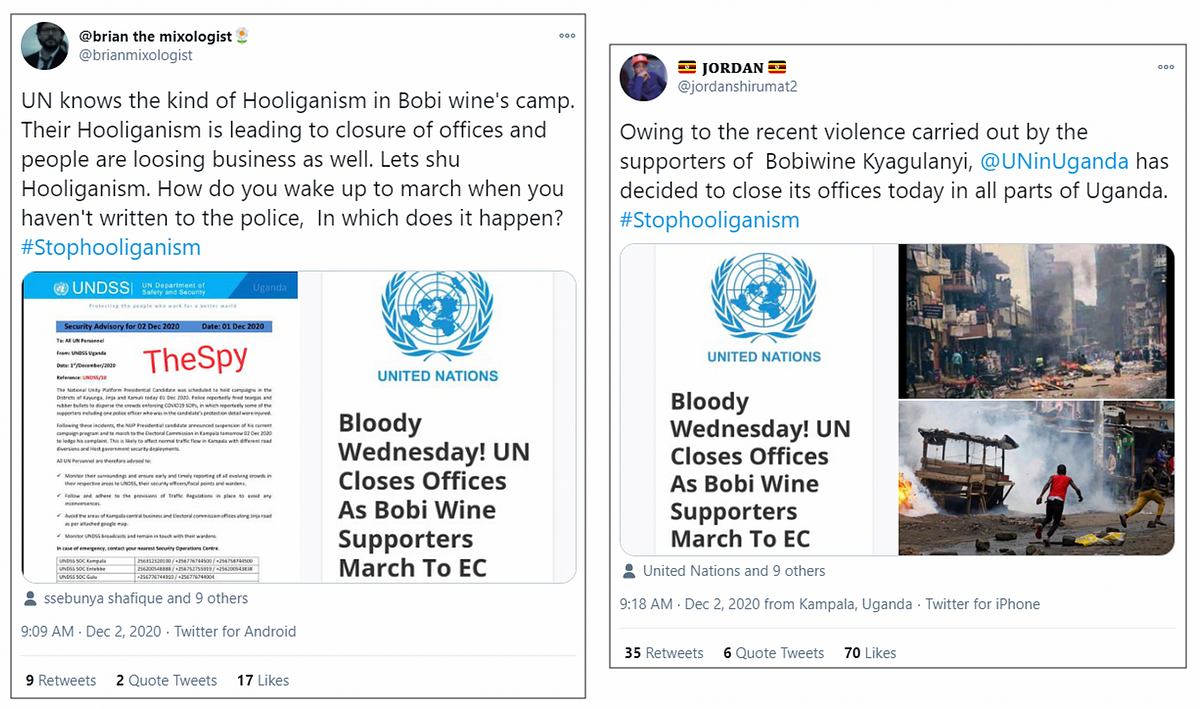
The image was a screenshot from a story written by a website called SpyUganda. The website claims to be an online newspaper known for “speaking what others fear,” and posts a combination of real information and disinformation written to look like news articles. The language of the article and the alleged document from the UN Department of Safety and Security are written with poor grammar and spelling mistakes. There is also no evidence from formal United Nations channels indicating the closure of any of their offices on November 2.
Misrepresenting Bobi Wine’s sexuality
According to a Pew Research study from 2013, 96 percent of Ugandans believe homosexuality should not be accepted by society. In 2014, Museveni signed into law the Anti-Homosexuality Act (dubbed the “kill the gays” bill before the death penalty was changed to life imprisonment). Although the Ugandan Constitutional Court later nullified the law, homophobic rhetoric is still extremely common among lawmakers and high-ranking government officials, including Museveni himself.
In an apparent attempt to capitalize on the country’s extreme homophobic bias, anti-Wine accounts claimed Wine identified as gay. The accounts used the #StopHooliganism hashtag to amplify the narrative, claiming that Wine had the support of the LGBT community because he “promoted homosexuals.” The post also amplified the narrative that Wine was an alcoholic, and, coupled with his alleged support of LGBT rights, was unfit to be president of the country.
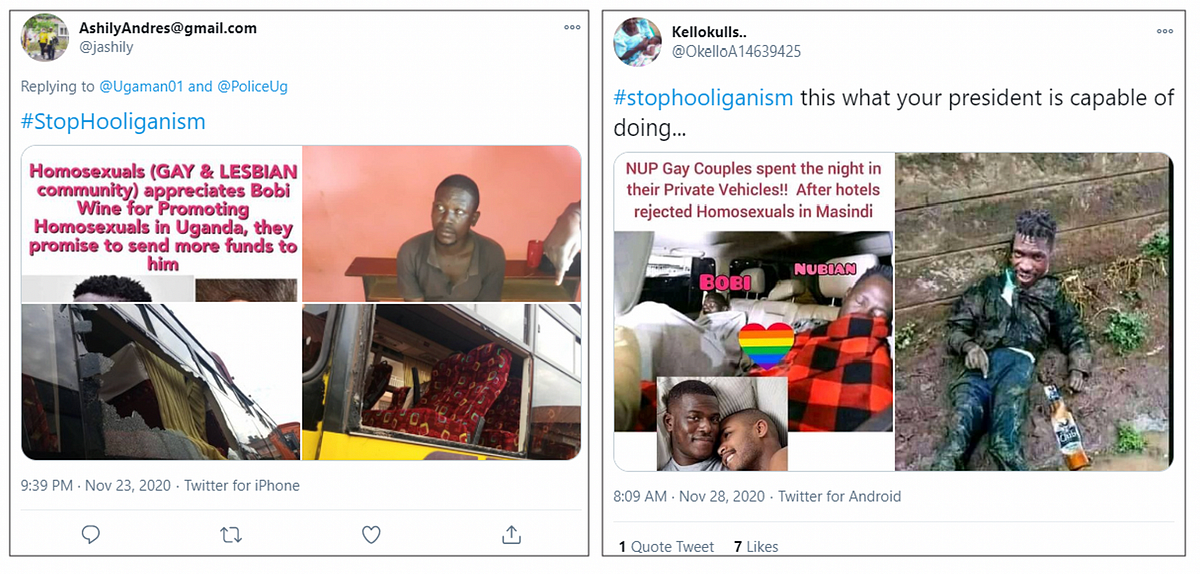
#BeautifulUganda
On November 20, Wine was released from police custody after being arrested two days prior. Reuters also broke the news that at least 37 people had died during protests over Wine’s arrest, which quickly spread to other global news outlets. In response, many of the accounts that had promoted the #StopHooliganism hashtag tweeted images of Uganda with the hashtag #BeautifulUganda, encouraging people to come visit the country and presenting it as a tourist attraction.
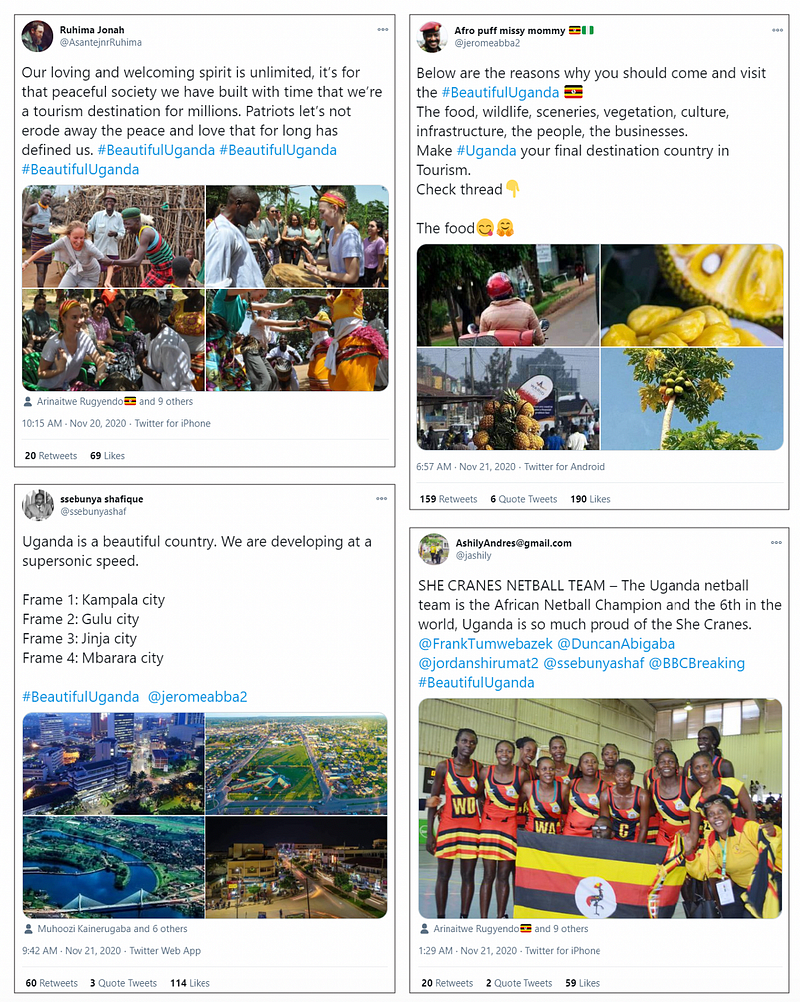
Of the 2,140 tweets between November 18 and November 23, only 177 were original tweets, equating to 8 percent of the total count, while 64 percent of the total posts were retweets. Only 514 unique users quoted, replied to or created original tweets using the hashtag #BeautifulUganda.
Ugandan citizens will vote for their next president on January 14, 2021, in an election already marred by violence. Opposition candidates face an uphill battle to the polls, coming face-to-face with both armed forces and groups of social media accounts spreading disinformation.
Cite this case study
Tessa Knight, “Pro-government accounts use old images to depict Ugandan protesters as hooligans,” Digital Forensic Research Lab (DFRLab), December 9, 2020, https://dfrlab.org/2020/12/09/pro-government-accounts-use-old-images-to-depict-ugandan-protesters-as-hooligans/.

